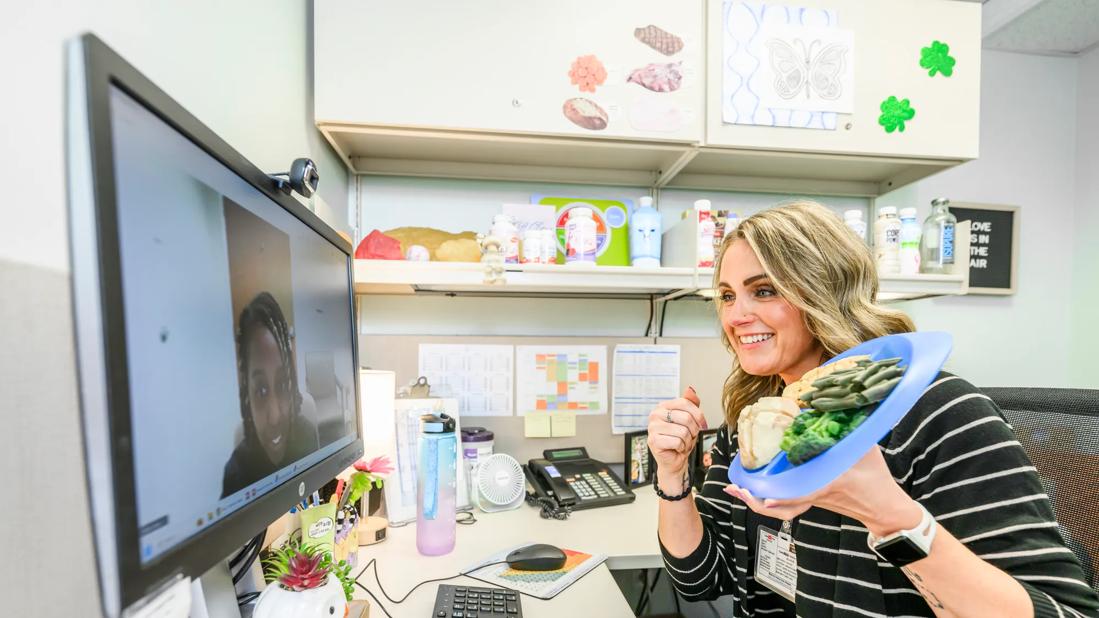Distance health for disease management

Certified nurse practitioner Pamela Combs of Cleveland Clinic’s Endocrinology & Metabolism Institute knew she was doing something radical for her cholecystectomy patient.
Advertisement
Cleveland Clinic is a non-profit academic medical center. Advertising on our site helps support our mission. We do not endorse non-Cleveland Clinic products or services. Policy
“He had a history of diabetes and gastric bypass,” says Combs, MSN, BC-ANP, CDE. “I was consulted to see him in the hospital to ensure his glucose levels were stable. But from listening to his story, I knew his diabetes program was wrong for him. He really didn’t need the insulin pump that he was on.”
Combs devised a new therapy — she removed the pump, drastically reducing the amount of insulin he needed — but knew the revised plan of care would require close follow-up. The patient was soon to be discharged home which is a two-hour drive from Cleveland Clinic’ main campus. So Combs suggested a second radical idea: virtual visit follow-ups.
Now, through a camera on his smartphone and the Cleveland Clinic Express Care® Online app, the patient has regular appointments with Combs, without ever leaving his home. “We are in the age of innovation and technology, and this is what patients want,” says Combs.
Combs and endocrinologists in her department have been offering follow-ups via webcam since 2014.
It’s a convenient option for patients who travel long distances for care and hospitalization at Cleveland Clinic. Making return trips for follow-up isn’t always possible for patients. Plus following up with hometown doctors isn’t always ideal, particularly when Cleveland Clinic’s endocrinology healthcare team has already established a relationship with patients and have created or adjusted their diabetes care plans. Continuity of care is important to obtain the best outcomes.
“Not all disease states are appropriate for virtual visits, but diabetes is,” says Combs. “The work is mostly cognitive. I have the patient’s medical record in front of me. The patient updates me on their general health and blood sugar numbers (subjective report). I can order blood work, if needed, and confirm or recommend adjustments to their care plan.” Obviously, the patient also needs face-to-face care as well, at different intervals, and I like to work in collaboration with their local physicians.
Advertisement
Each appointment lasts 15 to 30 minutes. Using her webcam in Cleveland, Combs sees established patients from as far away as Texas and Arizona who have seen her in person previously.
Not everyone is comfortable with virtual visits yet, including most commercial insurers. As a result, Combs’s patients self-pay by credit card before they log in to the videoconference. The amount is nominal, she says, often less than it would cost to travel to Cleveland Clinic.
For patients wary of virtual visits, Combs puts them at ease.
“As a seasoned clinician, I know which patients are right for this approach,” she says. “If I think a patient needs hands-on care, I’ll redirect them immediately. And I remind patients that I’m providing only diabetes management online. They still should see their primary care providers and other specialists in person.”
According to Combs, patient satisfaction with virtual diabetes follow-ups has been extremely high. Every one of Combs’s virtual visit patients have improved A1C levels, and their no-show rate is zero.
Unlike office visits, where patients check in and then wait to be seen, virtual visits start promptly when scheduled. So a 15-minute appointment is truly 15 minutes of a patient’s time. There’s no added wait or travel time.
“I’ve been in healthcare for more than 30 years, and the most recurring theme is that we provide care that is high quality, efficient and reasonably priced,” says Combs. “Virtual visits are proving to be an effective way to deliver quality care at the right cost”
Advertisement
In 2016, Combs and several other caregivers from Cleveland Clinic’s Endocrinology & Metabolism Institute provided a little over 100 virtual visits. In 2017, all 50-plus institute physicians and nurse practitioners will be available by webcam. The institute goal is to quadruple the volume of virtual visits, including offering a virtual Shared Integrated Medical Weight Management program.
Advertisement
Advertisement

Pheochromocytoma case underscores the value in considering atypical presentations

Advocacy group underscores need for multidisciplinary expertise

A reconcilable divorce

A review of the latest evidence about purported side effects

High-volume surgery center can make a difference

Advancements in equipment and technology drive the use of HCL therapy for pregnant women with T1D

Patients spent less time in the hospital and no tumors were missed

A new study shows that an AI-enabled bundled system of sensors and coaching reduced A1C with fewer medications